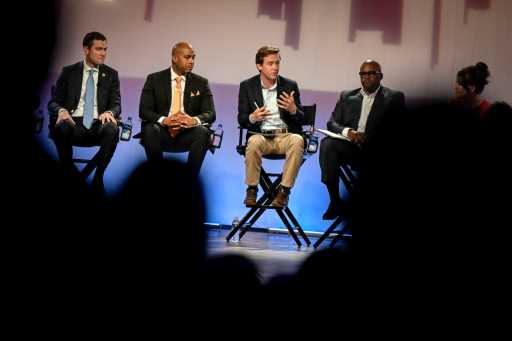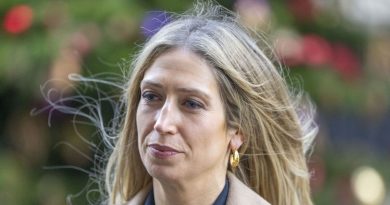Denver mayoral race sees different degrees of dark money
In the race to be Denver’s next mayor, millions of dollars is being spent by outside groups to support a handful of individual candidates — separating a vast field into haves and have-nots.
Mike Johnston and Kelly Brough stand as the haves. In the most recent filings, the Johnston-backing Advancing Denver reported $1.4 million in contributions and the Brough-backing A Better Denver reported $913,000.
The have-nots, meanwhile, have reported a combined total of $760,000 in contributions — but also have not listed individuals for the sources of money fueling their efforts.
For Advancing Denver, those contributors include LinkedIn co-founder Reid Hoffman, hedge fund manager Steve Mandel and Kent Thiry, the former CEO of Denver-based dialysis provider DaVita. Hoffman, far and away the biggest contributor, gave nearly $780,000 to the committee while also posting to his social network about support for his friend, Johnston. Mandel is in for $250,000 so far and Thiry for $150,000.
None of the three list Denver as their home in campaign finance reports, though Thiry lists Denver-adjacent Cherry Hills Village as his home city. Contact information for Advancing Denver could not be found. Its articles of incorporation list an apartment in the Capitol Hill neighborhood.
In a statement, Johnston’s campaign distanced itself from the outside group.
“The independent groups operate totally separately from the campaign and they’re going to do whatever they want to do,” Johnston spokesperson Jordan Fuja said. “Our focus on the campaign remains the same as it’s been since day one, which is Mike talking directly to voters day in and day out about his plans to tackle our homelessness crisis, make housing more affordable, and make Denver America’s best city.”
The Brough-backing A Better Denver’s funders include developer Lloyd Fulenwider, who gave $50,000, and $25,000 from Patrick Broe, who runs a real estate investment firm. Both list Denver as their home city.
But, A Better Denver also reports most of its money coming from third-party committees and groups that don’t report their individual donors. It reported $450,000 from the National Association of REALTORS Fund — accounting for nearly half its bankroll — and $299,000 from other businesses and associations.
Not all aggregate funds are the same, Lynea Hansen, who is running A Better Denver, said. The REALTORS Fund, for example, represents like-minded professionals and only takes money from certified REALTORS, she said. Other donating committees have names indicating backing from construction, contracting, and apartment associations.
It may not be possible to draw a straight line from a donor to the recipient, but it makes a general values statement, unlike committees with vague, anodyne names.
“There’s more than just transparent and dark money,” Hansen said. “There’s some that sit in the middle.”
A Better Denver formed to back Brough as “the only candidate who can hit the ground running on day one and get Denver back on track,” Hansen said, and it seeks to get that message out to voters.
Ready Denver, which is backing Leslie Herod, has reported raising $200,000, most of which comes from its associated nonprofit. The lawyer who filed the articles of incorporation for the nonprofit said he could not comment on behalf of his client but would pass on the request for comment. It was not returned. Ready Denver also reported $15,000 from LGBTQ Victory Fund and $5,000 from the LPAC, which advocates for LGBTQ women and nonbinary candidates.
Herod’s campaign spokesperson, Holly Shrewsbury, noted that the latter two indicate support Herod “is proud to have,” though the campaign doesn’t coordinate with Ready Denver or any other outside groups.
“The huge amounts of money coming from out-of-state billionaires to other mayoral campaigns shows why transparency is so vitally important to our election process,” Shrewsbury said. “… We sincerely hope that any organizations that support Leslie are transparent in their contributions to any source.”
There has been some apparent overlap between the campaign and Ready Denver. According to campaign finance records, the campaign paid longtime community activist Alvertis Simmons $42,000 between October 2022 and March 1 for consulting work. On March 16, Ready Denver paid Simmons $5,250 for canvassing, according to the records. There is no mandated waiting period or prohibition in city rules about such a move.
Shrewsbury said the campaign and Simmons parted ways Feb. 28 and “his actions and employment after that point have nothing to do with the Leslie for Mayor campaign.”
Reached by phone, Simmons said he wasn’t aware of Ready Denver, but that he had done work with Herod’s campaign previously, along with others. He said he mostly just works at the direction of former Mayor Wellington Webb. Webb has endorsed Herod’s bid.
The other biggest outside spender in the race is Denver Firefighters Local 858. It has spent about $120,000 supporting mayoral candidate and current city council member Debbie Ortega, and another $174,000 supporting a slate of city council candidates. It received about $94,000 from the union’s political action committee, but also $200,000 from Forward Denver.
Forward Denver is a nonprofit registered with the Colorado Secretary of State but otherwise without much information readily available about it. A message left with the registered agent wasn’t returned.
This is the first election with the Fair Election Fund and related stricter campaign finance limits for direct contributions to campaigns. The top three campaigns in terms of fundraising — Brough, Johnston and Herod — have signed onto the fund and the tighter requirements. They are also the ones seeing the most outside spending to boost their chances to make the runoff election.
It’s not a coincidence, Hansen, of the Brough-backing A Better Denver, said.
“When you think about the number of potential voters in Denver, it’s a very large universe and they’re very expensive to talk to,” Hansen said. “It’s not like everyone is communicating in the same ways.”
It’s a similar point raised by Andrew Short, executive director of One Main Street Denver. One Main Street is another outside spending group, but not involved in the mayoral race. It has so far reported about $140,000 in contributions to back a slew of city council candidates. Independent expenditures are playing a larger role in educating voters this cycle, he said.
“Even though this is often done by well-meaning folks, often when we see more stringent campaign finance limits in the political realm, we see more dark money organizations,” Short said. “And that’s at every level of government operations.”
Independent spending groups like One Main Street can help voters understand general alignment on certain issues, he said. In One Main Street’s case, Short said its values are expanding the middle class, fixing aging infrastructure and supporting small businesses, particularly those owned by women and minorities.
The group thinks the candidates it backs — Travis Leiker, Amanda Sandoval, Diana Romero Campbell, Kevin Flynn, Darrell Watson and Amanda Sawyer — will move the needle toward those goals, even if they don’t align 100% on every issue.
Short declined to name the committee’s donors and said it is following all federal and local laws. In their case, it’s also a practical matter, he said. It’s easier to collect money from like-minded donors into its affiliated nonprofit to spend on a variety of campaigns across municipal lines. Federal rules prevent these types of nonprofits from spending more than half of their funds directly on elections.
That said, he did advocate for more flexibility for donations to campaigns, especially as things become more expensive.
“Let’s create more space for candidates, allow candidates more power to run their own campaigns,” Short said. But, he added, there will always be a reason for independent expenditure committees.
Stay up-to-date with Colorado Politics by signing up for our weekly newsletter, The Spot.
Source: Read Full Article


